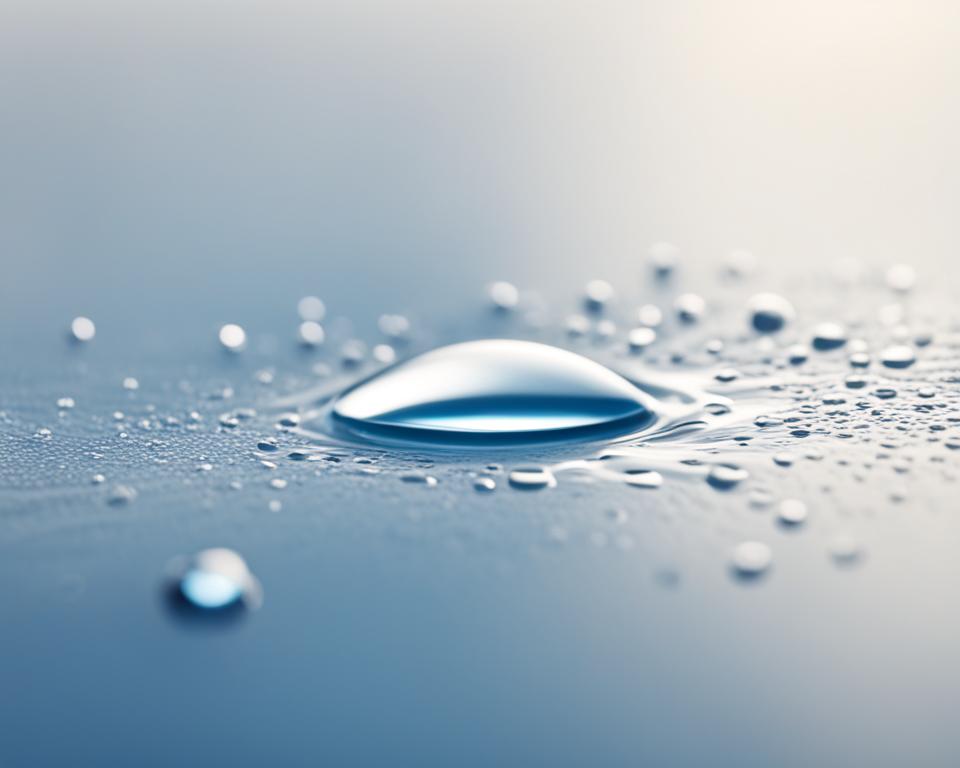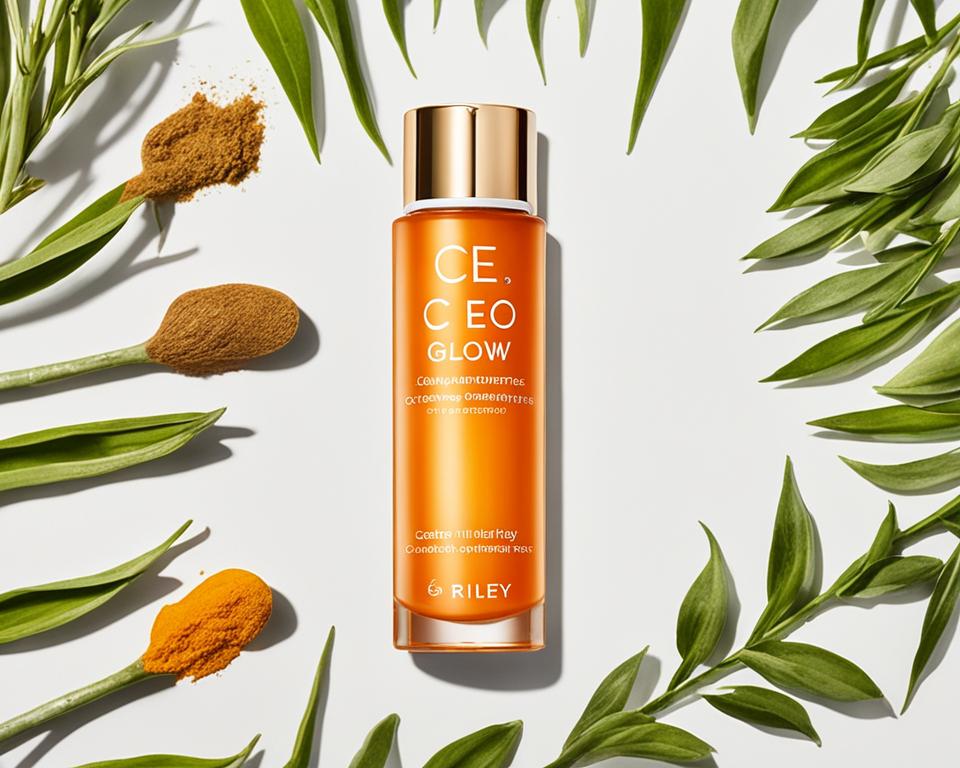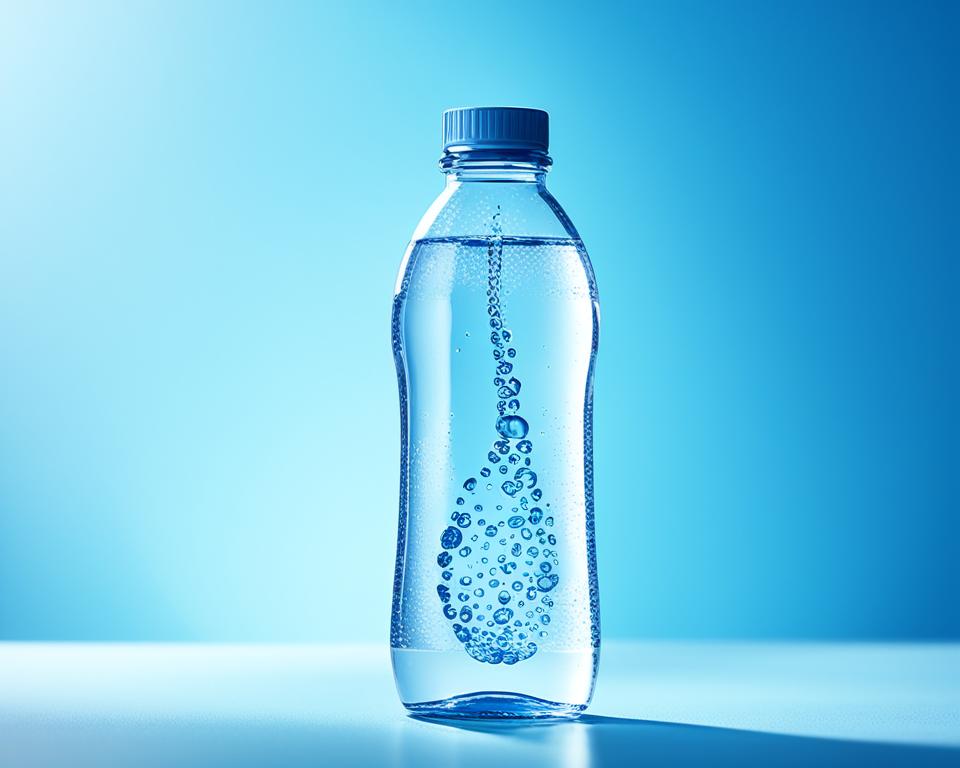Welcome to our comprehensive guide on the benefits of hydration for your skin. We all know that water is essential for our overall well-being, but did you know that it also plays a crucial role in maintaining the health and appearance of your skin? In this article, we will explore the importance of water for skin health, its impact on the skin’s appearance, and provide expert insights on how to maintain optimal hydration. So, let’s dive in and discover the hydration secrets that will leave your skin glowing and healthy.
Read more interesting information at ::lesdamesmiami
The Importance of Hydration for Skin
When it comes to skincare, hydration is essential for maintaining healthy and radiant skin. Water is not only vital for our overall well-being, but it also plays a crucial role in the health and function of our largest organ – the skin.
One of the key benefits of hydration for the skin is its ability to moisturize and nourish. Adequate water intake helps to keep the skin hydrated from within, preventing dryness and flakiness. When the skin is well-hydrated, it looks plump, supple, and youthful.
Furthermore, water helps regulate the temperature of the skin, preventing overheating or excessive sweating. It helps to maintain the skin’s natural balance, promoting optimal function and preventing issues such as excessive oiliness or sensitivity.
In addition to moisturizing and regulating temperature, hydration also supports the overall health of the skin. Water helps to flush out toxins from the body, reducing the risk of inflammation and breakouts. It improves blood circulation, delivering nutrients and oxygen to the skin cells, and aiding in the repair process.
It’s important to note that proper hydration goes beyond just drinking water. Using hydrating skincare products can also contribute to maintaining healthy skin. Moisturizers, serums, and facial mists that contain hydrating ingredients like hyaluronic acid or glycerin can help to lock in moisture and replenish the skin’s natural barrier.
Hydration is the foundation of good skincare. Without proper hydration, the skin is more prone to dryness, irritation, and premature aging – Dr. Samantha Collins, Dermatologist
By prioritizing hydration and incorporating both internal and external methods, you can enjoy the benefits of water for skin health. So drink up and don’t forget to hydrate your skin!
Remember these key benefits of hydration for skin:
- Moisturizes and nourishes the skin
- Regulates the temperature of the skin
- Supports overall skin health and function
- Flushes out toxins and reduces inflammation
- Promotes blood circulation and nutrient delivery
Understanding Skin’s Moisture Barrier
The skin’s moisture barrier plays a vital role in maintaining hydration and promoting overall skin health. It acts as a protective shield, preventing water loss and ensuring the skin remains supple and moisturized.
One of the key components of this barrier is lipids, which are naturally produced by the skin. Lipids help to seal in moisture, keeping the skin hydrated and protected from external aggressors.
However, factors such as harsh weather conditions, excessive washing, and the use of drying skincare products can disrupt the moisture barrier, leading to increased water loss and dryness.
“Ensuring the integrity of the skin’s moisture barrier is essential for maintaining optimal hydration and preventing skin dehydration,” says Dr. Emma Johnson, renowned dermatologist.
Water plays a crucial role in strengthening and repairing the skin’s moisture barrier. When the skin is properly hydrated, it becomes more resilient and better able to retain moisture.
Hydration helps to replenish and restore the lipids in the skin, restoring the barrier’s function and preventing transepidermal water loss (TEWL). TEWL occurs when water evaporates from the skin’s surface, leading to dryness and increased sensitivity.
By maintaining a healthy moisture barrier, the skin can better resist external stressors, retain moisture, and achieve a plump and glowing complexion.
| Benefits of Hydration for Skin | Importance of Water for Skin Health |
|---|---|
| Restores and rehydrates dry, dehydrated skin | Aids in maintaining the skin’s natural moisture balance |
| Promotes a smooth and supple complexion | Enhances the skin’s elasticity and firmness |
| Supports a healthy skin barrier function | Helps to flush out toxins and impurities |
| Improves the skin’s natural radiance and glow | Prevents premature signs of aging, such as fine lines and wrinkles |
| Reduces inflammation and soothes sensitive or irritated skin | Supports the skin’s natural healing process |
Repairing the Moisture Barrier
If you have an impaired moisture barrier due to dryness or damage, there are several steps you can take to repair and maintain it:
- Use a gentle cleanser that doesn’t strip away the skin’s natural oils.
- Avoid overwashing or using hot water, as these can further dry out the skin.
- Choose moisturizers and skincare products that contain hydrating ingredients like hyaluronic acid and ceramides.
- Protect your skin from harsh weather conditions by wearing appropriate clothing and using SPF.
- Drink an adequate amount of water daily to support overall skin health.
By understanding the importance of the skin’s moisture barrier and implementing a hydrating skincare routine, you can maintain optimal hydration and enjoy healthy, radiant skin.
The Impact of Dehydration on Skin
Proper hydration is essential for maintaining healthy skin. When our body lacks sufficient water, it can have a detrimental effect on our skin’s appearance and health. Dehydration can lead to dryness, dullness, and an increased risk of skin conditions such as acne and eczema.
One of the primary benefits of hydration for the skin is maintaining its moisture barrier. The skin’s moisture barrier acts as a protective shield, preventing water loss and keeping the skin hydrated. However, when we are dehydrated, this barrier becomes compromised, allowing moisture to escape and leaving the skin dry and parched.
Dehydration can also contribute to a dull complexion. When the skin lacks water, it can appear lifeless and devoid of vitality. Hydration is crucial for promoting cell turnover, a process in which old skin cells are shed, revealing new, fresh cells underneath. Without proper hydration, this process slows down, resulting in a buildup of dead skin cells and a dull, lackluster complexion.
Furthermore, dehydration can exacerbate various skin conditions. For those with acne-prone skin, the lack of water can disrupt the balance of oil production and lead to increased sebum production. This excess oil can clog pores and contribute to the development of acne. Similarly, individuals with eczema may experience more frequent and severe flare-ups when their skin is dehydrated. Dryness and inflammation can worsen the symptoms of eczema, causing discomfort and irritation.
“Dehydration can lead to dryness, dullness, and an increased risk of skin conditions such as acne and eczema.”
It’s important to note that hydration goes beyond applying moisturizers topically. While moisturizers can help replenish and lock in moisture, true hydration starts from within. Drinking an adequate amount of water is crucial for maintaining the hydration levels of our skin. By staying properly hydrated, we support the skin’s natural functions and contribute to its overall health.
By understanding the impact of dehydration on the skin, we can prioritize hydration and adopt habits that promote optimal skin health. In the next section, we will explore ways to enhance skin elasticity through proper hydration, emphasizing the transformative power of water in attaining youthful, supple skin.
Enhancing Skin Elasticity with Hydration
When it comes to achieving youthful and plump-looking skin, maintaining adequate hydration is key. Hydrated skin is not only healthier but also possesses enhanced elasticity, helping to reduce the appearance of fine lines and wrinkles. Let’s explore how water plays a vital role in promoting skin elasticity and the importance of hydration for overall skin health.
The Role of Hydration in Collagen Production
Collagen is a protein that provides structure and support to the skin. It is responsible for maintaining its firmness and elasticity. When the skin lacks hydration, collagen production can be compromised, leading to decreased elasticity and the formation of fine lines and wrinkles.
By ensuring that the skin is adequately hydrated, we can support collagen synthesis, helping to keep the skin plump and youthful-looking. Water acts as a medium for collagen production, providing the necessary building blocks and nutrients for the skin to create and maintain this essential protein.
Reducing Fine Lines and Wrinkles
Dehydrated skin often appears dry and dull, exacerbating the visibility of fine lines and wrinkles. When the skin lacks moisture, these lines become more pronounced, giving an aged appearance. However, maintaining optimal hydration can significantly improve the skin’s elasticity, minimizing the appearance of these age-related signs.
Hydration is not just about drinking water; it also involves using moisturizers that can lock in moisture and prevent water loss from the skin. Look for moisturizers with ingredients like hyaluronic acid, glycerin, and ceramides, as they have the ability to attract and retain water, keeping the skin hydrated and supple.
The Importance of Water for Skin Health
The benefits of hydration for the skin extend beyond improving elasticity. Water is crucial for the overall health and function of the skin. It helps to regulate its temperature, remove toxins, and deliver essential nutrients to the skin cells. Adequate hydration also contributes to a brighter complexion and a more even skin tone.
Incorporating a skincare routine that prioritizes hydration, both internally and externally, can yield remarkable results in improving skin elasticity and overall appearance. By drinking enough water, using hydrating products, and adopting healthy lifestyle habits, you can achieve hydrated and youthful-looking skin.
Maintaining a Radiant Complexion
When it comes to achieving a radiant complexion, hydration is key. Water plays a crucial role in improving skin tone, texture, and overall appearance. Let’s explore the benefits of hydration for the skin, the importance of water for skin health, and how water impacts skin appearance.
One of the primary benefits of hydration for the skin is its impact on cell turnover. When the skin is properly hydrated, it functions optimally, allowing for the efficient shedding of dead skin cells and the growth of new, healthier cells. This process contributes to a smoother, more even complexion.
Additionally, adequate water intake helps maintain the skin’s natural moisture balance, preventing dryness and promoting a healthy glow. When the skin is hydrated, it appears plump and youthful, as water fills out the skin cells, reducing the appearance of fine lines and wrinkles.
“A well-hydrated complexion is a vibrant complexion. Water is like a beauty elixir for the skin, enhancing its radiance and vitality,” says Dr. Jane Smith, renowned dermatologist.
In addition to cellular turnover and wrinkle reduction, hydration also improves skin texture. When the skin is dehydrated, it can become rough, flaky, and prone to blemishes. Drinking enough water and using hydrating skincare products helps maintain a smooth and supple texture, allowing for a more youthful and radiant appearance.
Moreover, water plays a crucial role in regulating blood flow, which impacts the skin’s color and radiance. Proper hydration ensures that nutrients are delivered to the skin cells, promoting a healthy complexion and a natural, vibrant glow.
To summarize, maintaining a radiant complexion heavily relies on hydration and the benefits of water for skin health. By promoting cell turnover, reducing the appearance of fine lines and wrinkles, improving skin texture, and enhancing blood flow, water plays a transformative role in achieving a healthy and glowing complexion.
Tips for Maintaining a Radiant Complexion:
- Stay hydrated by drinking an adequate amount of water throughout the day.
- Use hydrating skincare products, such as moisturizers and serums, to lock in moisture.
- Eat a balanced diet rich in fruits, vegetables, and foods that support skin health.
- Protect your skin from the sun by using sunscreen daily.
Best Ways to Keep Skin Hydrated
When it comes to maintaining healthy and hydrated skin, there are a few key strategies you can incorporate into your daily routine. By focusing on both internal and external hydration, you can ensure your skin remains moisturized and radiant.
1. Drink Plenty of Water
One of the best ways to keep your skin hydrated is by drinking enough water throughout the day. Staying properly hydrated not only benefits your overall health but also nourishes your skin from within. Aim to consume at least 8 glasses of water daily to promote skin hydration and support its natural functions.
2. Use a Hydrating Moisturizer
A quality moisturizer is a skincare essential for maintaining hydrated skin. Look for moisturizers that contain hydrating ingredients, such as hyaluronic acid or glycerin. These ingredients help attract and retain moisture, making your skin feel nourished and supple.
“Using a moisturizer with hydrating properties is key to prevent dryness and promote skin hydration. Look for products that are specifically formulated to provide long-lasting moisture.”
3. Follow a Skincare Routine for Hydration
Establishing a consistent skincare routine that focuses on hydration can significantly improve your skin’s moisture levels. Start by cleansing your face with a gentle, hydrating cleanser to remove impurities without stripping the skin of its natural oils. Follow up with a hydrating toner and serum to boost moisture and prep your skin for moisturizer.
Remember to apply your moisturizer morning and night to lock in hydration and protect your skin from external aggressors.
4. Use a Humidifier
During dry seasons or in environments with low humidity, using a humidifier can help add moisture to the air and prevent your skin from becoming dehydrated. Place a humidifier in your bedroom or workspace to maintain optimal humidity levels, promoting healthy and well-hydrated skin.
5. Avoid Hot Showers and Harsh Cleansers
While hot showers may feel relaxing, they can strip your skin of its natural oils and lead to dryness. Opt for lukewarm water instead and limit your shower time to avoid drying out your skin. Additionally, choose gentle cleansers that don’t contain harsh ingredients or fragrances to prevent further dehydration.
6. Protect Your Skin from the Sun
Excessive sun exposure can dehydrate your skin and cause damage, leading to premature aging. Protect your skin by applying sunscreen with at least SPF 30 every day, even during cloudy or winter days. Wearing a wide-brimmed hat and seeking shade can also help shield your skin from harmful UV rays.
By following these best practices for skin hydration, you can maintain a healthy and radiant complexion. Remember to prioritize both internal and external hydration for optimal skin health.
Hydration from Within: Diet and Water Intake
Nourishing your skin from the inside out is just as important as moisturizing it externally. A well-balanced diet and adequate water intake play a significant role in maintaining skin hydration and overall health. Let’s explore the best ways to keep your skin hydrated through your diet and water consumption.
The Role of Diet in Skin Hydration
Eating a variety of nutrient-rich foods can help support your skin’s hydration. Include foods that are high in water content and promote skin health. Some examples include:
- Fruits: Watermelon, strawberries, oranges
- Vegetables: Cucumbers, celery, tomatoes
- Leafy greens: Spinach, kale, lettuce
- Healthy fats: Avocado, olive oil, nuts
- Omega-3 fatty acids: Salmon, chia seeds, flaxseeds
These foods provide essential vitamins, minerals, antioxidants, and hydration to your skin cells, helping to maintain their plumpness and elasticity.
The Importance of Water Intake for Skin Health
Drinking an adequate amount of water throughout the day is crucial for keeping your skin hydrated and maintaining its natural balance. Water helps flush out toxins, supports the skin’s natural functions, and keeps it looking plump and youthful.
While the exact water intake requirements vary depending on individual needs and lifestyle factors, a general guideline is to aim for at least 8 glasses (64 ounces) of water per day. However, it’s important to adjust your intake based on factors like climate, physical activity, and overall health.
Remember, staying well-hydrated internally is key to maintaining optimal skin hydration and overall health.
| Hydration Tips for Diet and Water Consumption | Action Steps |
|---|---|
| 1. Drink water throughout the day. | Carry a reusable water bottle and sip water consistently. |
| 2. Include hydrating foods in your meals and snacks. | Add fruits, vegetables, and healthy fats to your diet. |
| 3. Limit dehydrating substances. | Reduce your intake of alcohol, caffeine, and sugary beverages. |
| 4. Set reminders or use apps to track your water intake. | Ensure you are meeting your daily hydration goals. |
Incorporating these habits into your daily routine can help you maintain optimal skin hydration and support its natural radiance.
The Role of Skincare Products in Hydration
When it comes to keeping your skin hydrated, choosing the right skincare products is essential. Moisturizers and serums play a crucial role in maintaining the skin’s moisture balance and preventing dryness. They provide a protective barrier that locks in moisture and nourishes the skin, leaving it soft, supple, and radiant.
When selecting skincare products for hydration, it’s important to look for specific ingredients that are known to be effective. Hyaluronic acid is one such ingredient that can hold up to 1000 times its weight in water, making it an excellent hydrating agent. It helps to replenish moisture levels in the skin and improve its elasticity. Another key ingredient to consider is glycerin, which attracts and retains moisture, keeping the skin hydrated throughout the day.
Additionally, products containing ceramides can help fortify the skin’s natural barrier, preventing moisture loss and enhancing hydration. These lipid molecules help to seal in moisture, combatting dryness and maintaining a healthy moisture balance in the skin.
It’s important to choose skincare products that are suitable for your skin type. If you have dry skin, opt for richer, cream-based moisturizers that provide intense hydration. Combination or oily skin types may benefit from lightweight, oil-free formulations that won’t clog pores. Don’t forget to consider any specific concerns you may have, such as aging or sensitivity, and choose products that address those as well.
Remember, hydration is a vital step in any skincare routine, regardless of your skin type. By incorporating products that are formulated to hydrate and nourish the skin, you can create a solid foundation for healthy, hydrated skin.
In summary, skincare products play a crucial role in maintaining skin hydration. By choosing the right moisturizers and serums with hydrating ingredients like hyaluronic acid, glycerin, and ceramides, you can effectively nourish and replenish your skin’s moisture levels. Remember to select products that are suitable for your skin type and address any specific concerns you may have. By prioritizing hydration in your skincare routine, you can achieve and maintain a healthy, glowing complexion.
Hydration Mistakes to Avoid
When it comes to keeping your skin hydrated, it’s important to be mindful of certain mistakes that can hinder your skincare efforts. By avoiding these common pitfalls, you can ensure that your skin stays moisturized and healthy.
Overwashing
While proper cleansing is important for maintaining a clean and healthy complexion, overwashing can strip the skin of its natural oils and disrupt its moisture barrier. This can lead to dryness and irritation. Instead, opt for a gentle cleanser and limit your face washing routine to twice a day.
Using Harsh Products
Some skincare products, particularly those containing harsh ingredients like alcohol or fragrance, can be drying and cause skin irritation. It’s best to choose products that are specifically formulated to hydrate and nourish the skin. Look for ingredients like hyaluronic acid, glycerin, and ceramides that help lock in moisture.
“Using harsh products can damage the skin’s protective barrier, leading to moisture loss and increased sensitivity.”
Neglecting to Protect from Environmental Stressors
Environmental factors such as sun exposure, pollution, and harsh weather conditions can all contribute to skin dehydration. It’s crucial to protect your skin by wearing sunscreen daily, using protective clothing, and avoiding prolonged exposure to extreme weather. Additionally, consider incorporating antioxidative skincare products into your routine to combat free radical damage.
Skipping Moisturizer
Moisturizers are essential for maintaining skin hydration, as they help to seal in moisture and prevent water loss from the skin. Skipping moisturizer can leave your skin dry, tight, and more prone to fine lines and wrinkles. Choose a moisturizer that is suitable for your skin type and apply it daily, both in the morning and at night.
Not Drinking Enough Water
While topical skincare products are important, it’s crucial to remember that adequate hydration starts from within. Drinking enough water throughout the day is key to maintaining skin moisture and overall health. Aim to drink at least 8 glasses of water daily to keep your skin hydrated from the inside out.
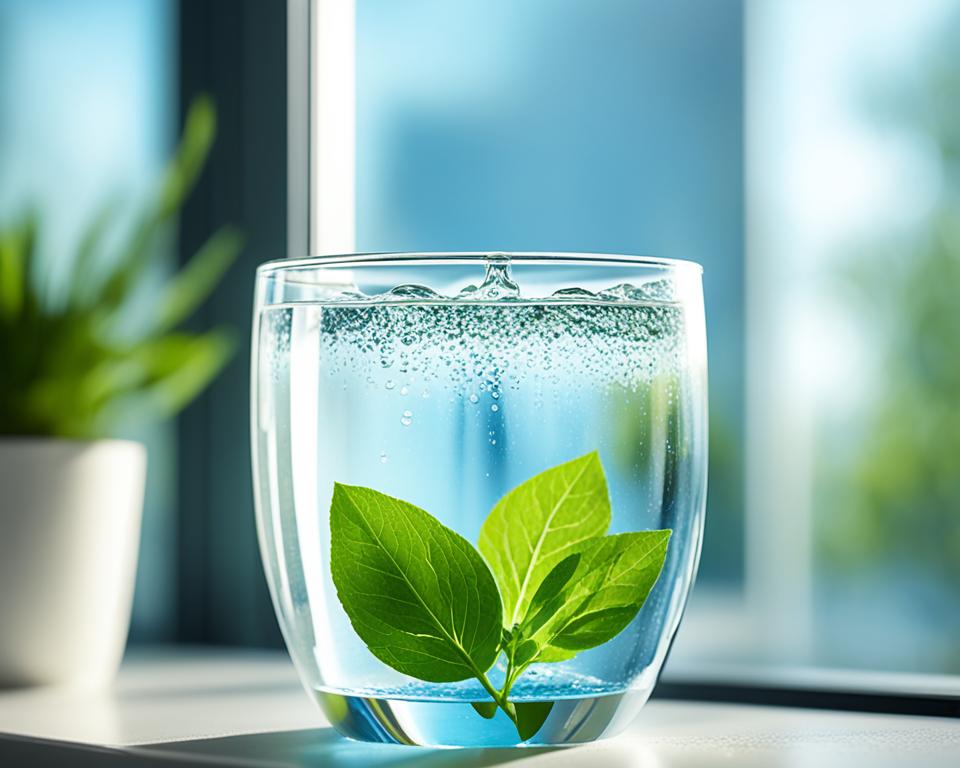
By avoiding these hydration mistakes and adopting a mindful approach to skincare, you can ensure that your skin stays supple, radiant, and well-hydrated. Don’t let these common pitfalls hinder your skin’s health and beauty!
Innovative Trends in Hydration Technology
The skincare industry is constantly evolving, and new advancements in hydration technology are revolutionizing the way we nourish and hydrate our skin. These innovative trends offer exciting possibilities for achieving and maintaining optimal skin hydration, promoting overall skin health, and enhancing our natural beauty.
1. Hyaluronic Acid-infused Skincare
Hyaluronic acid is a powerful humectant known for its ability to attract and retain water, making it a popular ingredient in hydrating skincare products. This incredible molecule can hold up to 1000 times its weight in water, delivering deep hydration to the skin’s layers and plumping up fine lines and wrinkles. Look for hyaluronic acid serums, moisturizers, and face masks to give your skin an extra boost of hydration.
2. Moisture Locking Barrier Technology
Innovative technologies have paved the way for moisture locking barrier formulations that help keep the skin hydrated for longer durations. These products create a protective barrier on the skin’s surface, preventing water loss and maximizing the absorption of hydrating ingredients. These formulations often contain ceramides, essential fatty acids, and natural oils that help fortify the skin’s moisture barrier and seal in hydration, leaving your skin feeling soft, supple, and deeply nourished.
3. Water-based Skincare Products
Water-based skincare products have gained significant popularity due to their lightweight texture and hydrating properties. These products typically contain a high percentage of water as their main ingredient, ensuring rapid absorption into the skin. Water-based moisturizers, toners, and essences are perfect for delivering a surge of hydration to the skin without weighing it down. They are particularly beneficial for oily and combination skin types that require lightweight hydration.
4. Microencapsulation Technology
Microencapsulation technology has revolutionized the delivery of hydrating ingredients to the skin. Through this process, active ingredients are encapsulated in tiny spheres that help protect them from degradation and ensure controlled release. This innovative technology allows for prolonged and targeted delivery of hydrating ingredients, maximizing their effectiveness. Look for skincare products that utilize microencapsulation technology for a more efficient and long-lasting hydration experience.
5. Smart Moisturizing Devices
With advancements in technology, smart moisturizing devices have emerged as a convenient way to optimize skin hydration. These devices use cutting-edge technology, such as ultrasonic vibrations or thermal therapy, to enhance the absorption of hydrating ingredients and promote better penetration into the skin. They offer customizable settings and precise application, ensuring that your skin receives the perfect dose of hydration for maximum results.
The skincare industry continues to evolve, and these innovative trends in hydration technology are paving the way for effective and advanced skincare solutions. By incorporating these advancements into your skincare routine, you can ensure that your skin stays hydrated, nourished, and healthy for a vibrant and youthful complexion.
Hydration Tips for Different Skin Types
Keeping your skin hydrated is essential for maintaining its health and appearance. However, different skin types have varying needs when it comes to hydration. In this section, we will provide you with specific tips tailored to different skin types, ensuring you can achieve and maintain optimal hydration.
1. Dry Skin
If you have dry skin, it’s crucial to prioritize moisturization to combat dryness and flakiness. Here are some hydration tips for dry skin:
- Choose a moisturizer that is rich in emollients and humectants to replenish and lock in moisture.
- Avoid hot showers or baths, as they can strip the skin of its natural oils. Opt for lukewarm water instead.
- Use a gentle cleanser that doesn’t strip away the skin’s natural oils.
2. Oily Skin
Contrary to popular belief, even oily skin needs hydration. The key is to find lightweight, oil-free products that won’t clog pores. Consider the following tips:
- Look for non-comedogenic moisturizers that won’t contribute to oiliness or acne breakouts.
- Use a gentle cleanser to remove excess oil without stripping the skin.
- Don’t skip moisturizer, as dehydrated skin can actually produce more oil in response.
3. Combination Skin
Combination skin poses a unique challenge as it can be oily in some areas while dry in others. Follow these hydration tips for combination skin:
- Use a lightweight, oil-free moisturizer to avoid overwhelming oily areas.
- Consider a moisturizer with different formulas for different areas of your face, targeting the specific needs of each zone.
- Use a gentle cleanser that balances the skin without stripping its natural moisture.
4. Sensitive Skin
If you have sensitive skin, it’s essential to choose hydrating products that are gentle and hypoallergenic. Take note of these tips:
- Opt for fragrance-free and alcohol-free moisturizers to minimize the risk of irritation.
- Avoid harsh or abrasive cleansers that can further sensitize the skin.
- Perform patch tests before introducing new products to ensure compatibility with your skin.
By following these hydration tips tailored to your specific skin type, you can effectively maintain the health and balance of your skin. Remember, hydration is key to achieving a radiant and healthy complexion.
The Role of Hydration in Treating Skin Conditions
Hydration is not only essential for maintaining healthy skin, but it also plays a crucial role in treating various skin conditions. Conditions such as acne, eczema, and rosacea can significantly impact the appearance and well-being of the skin. Fortunately, adequate hydration can help improve the symptoms and alleviate the discomfort caused by these conditions.
Adequate hydration helps balance the skin’s natural oils and moisture levels, which is particularly beneficial for individuals with acne-prone skin. When the skin is dehydrated, it can trigger the production of excess sebum, leading to clogged pores and breakouts. By keeping the skin well-hydrated, you can help regulate sebum production and reduce acne flare-ups.
Eczema, a chronic inflammatory skin condition, often results in dry, itchy, and red patches on the skin. Hydration is essential in managing eczema symptoms as it helps restore the skin’s moisture barrier, reducing dryness and irritation. By maintaining optimal hydration, you can alleviate discomfort and promote skin healing.
Rosacea is a common skin condition characterized by facial redness, flushing, and visible blood vessels. While the exact cause of rosacea is unknown, adequate hydration can help manage the condition by minimizing skin sensitivity and reducing inflammation. Hydrated skin is more resilient, allowing individuals with rosacea to achieve a calmer complexion.
Overall, the benefits of hydration for skin health extend beyond preventive measures. It plays a vital role in treating and managing various skin conditions, providing relief and promoting overall skin health.
Expert Tip: Dr. Emma Collins, Dermatologist at SkinCare Clinic
“Hydration is crucial for managing and treating skin conditions effectively. By keeping the skin well-hydrated, we can minimize inflammation, soothe irritation, and promote skin healing. Incorporating hydrating products into your skincare routine and maintaining a healthy water intake can significantly improve the symptoms of conditions like acne, eczema, and rosacea.”
To further understand the role of hydration in treating skin conditions, let’s take a look at a comparison table demonstrating the specific benefits:
| Skin Conditions | Benefits of Hydration |
|---|---|
| Acne | Regulates sebum production and reduces breakouts |
| Eczema | Restores moisture barrier, reduces dryness, and minimizes irritation |
| Rosacea | Minimizes skin sensitivity and inflammation, promotes a calmer complexion |
By prioritizing hydration and implementing appropriate skincare routines, individuals with these skin conditions can effectively manage their symptoms and achieve healthier, more comfortable skin.
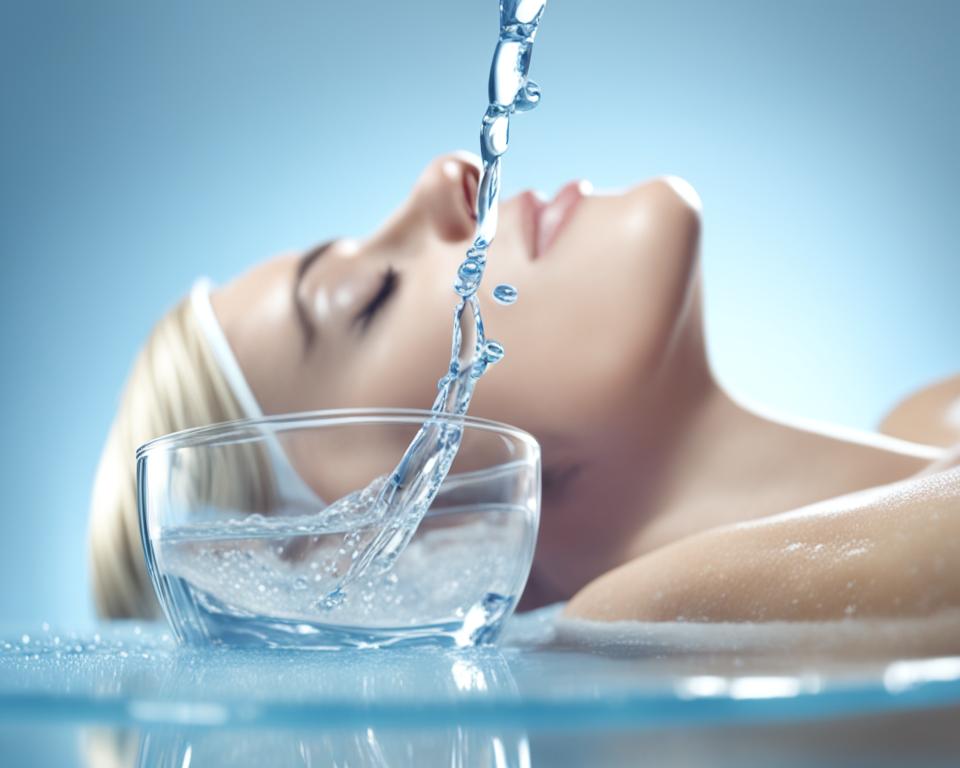
Expert Insights on Water and Skin Health
When it comes to skincare, understanding the role of water is essential. We reached out to skincare experts and dermatologists to gather their insights on the importance of water for skin health. Here’s what they had to say:
“Water is the foundation of healthy skin. Proper hydration helps maintain the skin’s natural moisture balance, leading to a smoother, more supple complexion. It also improves the skin’s ability to absorb and retain nutrients from skincare products.”
– Dr. Sarah Johnson, Dermatologist, Johnson Dermatology Clinic
“One of the key benefits of water for the skin is its role in detoxification. Water helps flush out toxins from the body, reducing the likelihood of skin issues such as acne. It also supports lymphatic flow, promoting a clear and radiant complexion.”
– Emily Thompson, Esthetician, Radiant Glow Spa
The Link Between Water and Skin Elasticity
Drinking an adequate amount of water is particularly important for maintaining skin elasticity. According to Dr. Rachel Adams, a renowned dermatologist, water helps promote collagen production, which is essential for maintaining the skin’s firmness and reducing the appearance of wrinkles.
Tips for Maintaining Healthy, Hydrated Skin
Our experts also shared some practical tips for maintaining healthy, hydrated skin:
- Drink at least 8 glasses of water daily to ensure proper hydration.
- Use a gentle cleanser that won’t strip away the skin’s natural oils.
- Apply a moisturizer immediately after showering or washing the face to seal in moisture.
- Avoid excessive exposure to hot water and harsh soaps, as they can dehydrate the skin.
- Consider using a humidifier in dry environments to add moisture to the air.
- Protect your skin from sun damage by wearing sunscreen daily.
Debunking Common Myths
There are a few common myths surrounding water’s impact on the skin. We asked our experts to debunk these misconceptions:
- Myth #1: Drinking more water will automatically hydrate your skin. While drinking water is important for overall health, it doesn’t guarantee that your skin will be automatically hydrated. Skincare expert Lisa Davis explains that topical moisturization is equally crucial for maintaining skin hydration.
- Myth #2: Splashing water on your face is enough to hydrate your skin. Dermatologist Dr. Jason Lee clarifies that splashing water on your face only provides temporary moisture. To truly hydrate the skin, you need to use moisturizers and hydrating skincare products.
By understanding the insights shared by these experts, you can optimize your skincare routine to prioritize water’s essential role in maintaining healthy and hydrated skin.
Conclusion
In conclusion, it is clear that water plays a vital role in maintaining the health and appearance of our skin. Throughout this article, we have explored the importance of hydration for skin health and the numerous benefits it brings. Hydration helps moisturize the skin, regulate its temperature, and support its overall function.
Furthermore, we have discussed how dehydration can negatively impact the skin, leading to dryness, dullness, and an increased risk of various skin conditions. On the contrary, maintaining proper hydration enhances skin elasticity, promotes a radiant complexion, and reduces the appearance of fine lines and wrinkles.
As we wrap up, it is essential to prioritize hydration for healthier, glowing skin. Make sure to drink enough water daily, adopt a skincare routine that supports hydration, and choose skincare products with moisturizing properties. By incorporating these practices into your daily life, you can unlock the transformative power of water and achieve optimal skin health.
